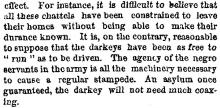ARMY OF THE WEST.
FROM GEN. HUNTER'S COMMAND.
...The depredations of forage and provisions would have been patiently borne, but that there are a few Union men who own slaves, which was supposed to be a sort of sacred possession to the loyal. The visit of Gen. Lane has brushed away the fancied security. There is no doubt but that much of the Union sentiment of Missouri slaveholders is not deserving the name, as it is only an anchor for holding on to their negroes, but there are others whose love for the old flag springs from unselfish grounds. When Gen. Fremont returned to Tipton this week he took some sixty more negroes back with him than he brought. Nobody knew exactly where they came from, but the circumstance was regarded as suspicious.
Complaints had been made of Gen. Lane's men enticing away negroes from the western portion of the state, but hitherto they ahd been safe in Springfield. Suddenly complaints began to pour in that the greater portion of the negroes in town had decamped. On Friday night, it would seem as if by preconcerted movement, the black population swarmed into the camps of the Kansas Brigade, and a few into others, acting as servants. In some cases whole families, including small children, were smuggled into the army wagons, and escaped notice until the column moved out of town. It is estimated that not less than a hundred and fifty negroes were abducted into Lane's camp on Friday night, and five hundred have been gathered up since his march from Kansas City. The Union men were large sufferers; here and there was a secession family which had been divested entirely of this species of property, deservedly for their active and real co-operation with the enemy.
GEN. LANE AND HIS SOLUTION OF THE NEGRO QUESTION.
Of course, Gen. Fremont, when called upon for the restoration of these slaves, promptly gave the order therefor. Gen. Hunter issued an order, it is said forbidding this species of robbery, but the question is one so delicate and requiring so much investigation that his orders can have but little effects. For instance, it is difficult to believe that all these chattels have been constrained to leave homes with being able to make their durance known. It is, on the contrary, reasonable to suppose that the darkeys have been as free to “run” as to be driven. The agency of the negro servants in the army is all the machinery necessary to cause a regular stampede. An asylum once guaranteed, the darkey will not need much coaxing.
Such an asylum they have in the camp of the Kansas Brigade. Smarting under the wrongs endured at the hands of Missourians five years since, Gen. Lane is now in a position to repay the debt.
As I understand it, Lane’s policy on this question is one of simply “letting slavery take care of itself.” He insists that “he shall not be converted wither into slaver catcher or slave dealer.” In a speech made to the Indiana regiments last night in response to a serenade, he expressly sad that “he will not fight this war if it is to be turned to pro-slavery purposes.” If slavery be ground to powder in this contest, he will regard it as one of the best results of the war.
His course is, when any person claims a runaway slave, to say, “Find your slave; if he is in my camp you can take him, if he is willing to go.” Upon receiving an order form the commanding general for the delivery of a slave, he hands the order to an aid, with instructions to accompany the owner through the camp, and it found, the slave is given up. It is needless to say that the search is seldom successful. The whole methods of adduction is irresponsible and is fast settling the question of slavery in Missouri. The rebels have taken many of their slaves south; the balance are [illegible] rapidly run off.
The consequences are a tremendous change in the sentiments of the people. Many of those who have hitherto ranked as Union men declare if this is to be made a war on slavery, they are going with the South. The patriotism of some of them is not deep rooted, but it is to be regretted that our army should labor under so grievous a charge. It is not fitting that soldiers should thus be made judge and executioner of the law confiscating the property and slaves of rebels.
"Gen. Lane and his Solution of the Negro Question," New York (NY) World, November 19, 1861, p. 1.

